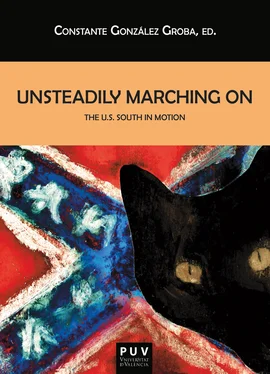Will’s decision to buy the telescope is not at all accidental: “the conviction grew upon him that his very life would be changed if he owned the telescope” ( LG 29). The main improvement resulting from this purchase is Will’s resolution to stop seeing his psychiatrist, since he can no longer afford it. His last session with Dr. Gamow is seen to be the starting point of his search, as the following exchange makes clear:
“Do you intend to become a seer?”
“A seer?”
“A see-er. After all a seer is a see-er, one who can see. Could it be that you believe that there is some ultimate hidden truth and that you have the magical means for obtaining it?” “Ha-ha, there might be something in that. A see-er. Yes.” “So now it seems you have spent your money on an instrument which will enable you to see the truth once for all?” ( LG 37, my emphasis)
Noticeably, a few pages earlier, the narrator had mentioned that Will “couldn’t help attributing magical properties to the telescope” ( LG 29, my emphasis). Dr. Gamow’s use of the same adjective, “magical,” suggests that the telescope is an extension of Will’s persona. In Percy’s aesthetics, reality can never be a firsthand experience and the characters often need intermediaries to grasp the meaning of the world they inhabit. The influence of the telescope on Will’s actions is as significant as that of the movies on Binx Bolling in Percy’s The Moviegoer and should therefore not be overlooked. The analyst is pointing out that Will is looking for “some ultimate hidden truth;” since the telescope is generally used to watch the sky, it can be assumed that truth comes from above, that is to say, from God.
Will’s decision to give up his therapy sessions shows that he has realized he was just hiding from the real world and did not want to face his responsibilities as a human being and take his life into his own hands: “Williston Barrett once again set forth into the wide world at the age of twenty-five […]. Once again he found himself alone in the world, cut adrift from Dr. Gamow, a father of sorts, and from his alma mater, sweet mother psychoanalysis” ( LG 41). Will’s new freedom may be frightening to him at first, but it is an inevitable step in any man’s life. It is necessary that at some point he should break away from his analyst—whom he sees as a father figure—and live his own life. As for psychoanalysis, it has been part of his life for so long that he has assimilated its method and thus believes he can move on without anyone overseeing him.
Percy points out Will’s newly acquired awareness of his destiny through free indirect discourse in the very last paragraph of the first chapter, which is meant to sum up Will’s motives: “I am […] an engineer in a deeper sense: I shall engineer the future of my life according to the scientific principles and the self-knowledge I have so arduously gained from five years of analysis” ( LG 41). Now that he understands himself, Will is ready to face the world. He decides to leave New York and become a “wayfarer” ( LG 353), confirming the narrator’s words that he is “a watcher and a listener and a wanderer” ( LG 10). Will takes his first step towards home when he follows one of the ladies he had spotted in the park into a hospital.
As the narrative unfolds, Will’s glances into the telescope become more and more meaningful. Rooted in what Percy calls “everydayness,” the second chapter opens with Will’s renewed attempt at taking a picture of the peregrine. He is more successful this time but the reader learns that his ultimate goal is to “catch the fierce eclipsed eye of the falcon” ( LG 43), which is another indication of Will’s desire to be a seer and to get to the heart of the act of seeing. Interestingly, Will has also “witnessed the peculiar behavior of the Handsome Woman and her beautiful young friend” ( LG 43), which makes his growing interest even stronger. The bench scene becomes a landmark in his life: “The bench, where the Handsome Woman had sat, was actually at ground zero. […] He smiled again. It was a sign. He knew he would see the two women again” ( LG 48). At this point, the reader is totally immersed in the novel but s/he is aware that “[a]s a consequence of a chance event the rest of [Will’s] life was to be changed” ( LG 3) and is therefore on the lookout for the key to understand the significance of the change. In actuality, there is more than one chance event in the novel since Will “luckily” sees the woman he noticed in the park in the subway and is so attracted to her mysterious self that he decides to tail her: “He followed the Handsome Woman into a great mauve pile of buildings. Inside he took a sniff: hospital” ( LG 48). The location hints at Will’s impending rebirth, and the scene that follows is the first step towards his integration into a new family, the Vaughts. The same process of being-becoming is at work in the character when Will remembers that he once came to the hospital for treatment because, due to his nervous condition, he had forgotten who he was, and that it is the place where he recovered his identity; hence his assertion: “I felt better in the hospital than anywhere else” ( LG 56). Introducing this episode as an interpolated story within the story foreshadows Will’s confirmation of his identity. 6
In the hospital, Will makes the acquaintance of Jamie Vaught; the boy is there for leukemia treatment. Significantly, Will offers to lend him his telescope as a birthday gift, which confirms its function as an instrument of communication, designed to connect people. But the connection is not limited to the boy; Will also connects closely with each member of the Vaught family: “The Vaughts liked the engineer very much, each feeling that he was his or her special sort of person. […] Each saw him differently” ( LG 64). The Vaughts give Will an opportunity to step into the outside world, into a family that can be seen as a metaphor for the human population. In this respect, the following exchange between Mr. Vaught and Will, though brief and at first glance devoid of any special significance, can be seen as one of the novel’s many beginnings:
“You come on up here in the morning and see Jamie.”
“Yes sir.” ( LG 59)
Will is given a function, a purpose, and his situation echoes Lancelot’s question in Percy’s eponymous novel: “Have families ever loved each other except when some dread thing happens to somebody?” (55). Will offers his support to the Vaughts and they provide him with a new family. Jamie’s disease is the bond between them and provides the protagonist with a re-entry into the world of the living, of the family, of the community. Will tells the Vaughts, “All my immediate family are dead. Do you know this is the first time I have talked to a, ah, family in years. I had forgotten—” ( LG 56). The absence of a question mark, the use of aposiopesis and Will’s apparent discomfort when it comes to the concept of “family” make it clear that he has stepped into something new, even though the final dash also reminds the reader of Will’s amnesia and his feelings of déjà vu . It also proves that love is closely linked to catastrophe. While Rita, the Handsome Woman, talks to Will about Jamie’s condition, he “was thinking of wars and deaths at home. On the days of bad news there was the same clearing and sweetness in the air” ( LG 94). Will looks to another reality than that presented by Rita: he shows his ability to see what is good even in bad times. Consequently, though dislocated, Will seems to find solace in the apparent harmony of the past.
Читать дальше












